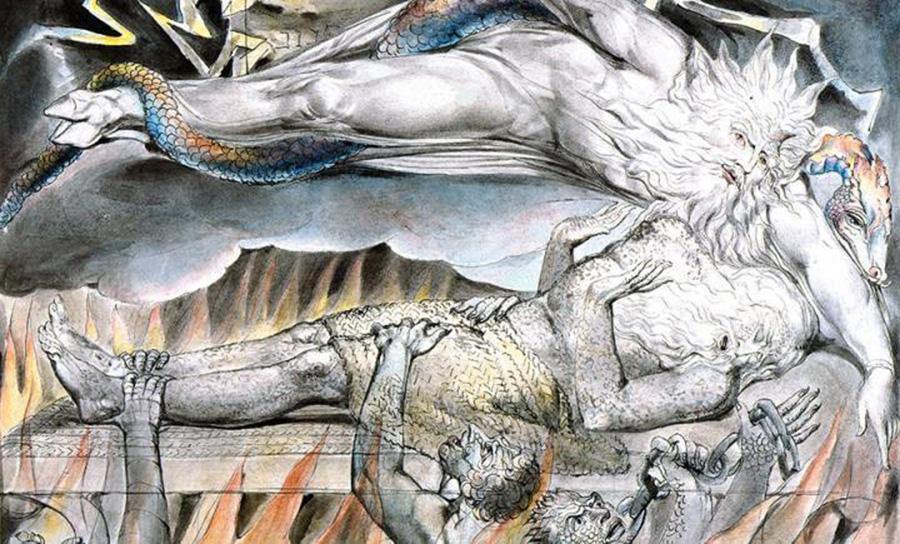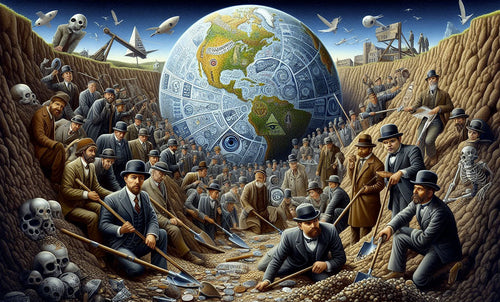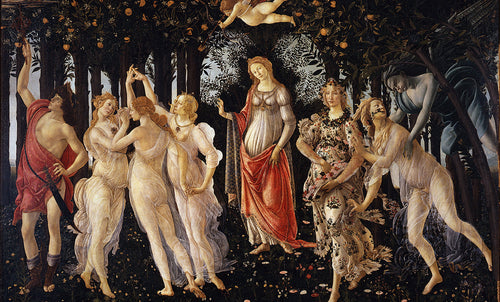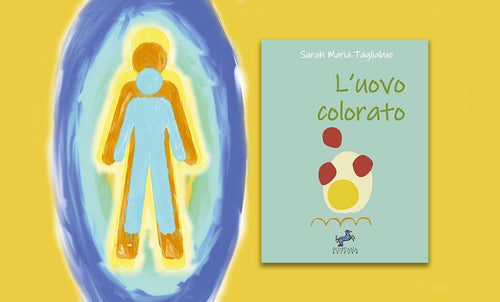
Jewish Kabbalah and the Epicurus Paradox - part 3
Fabrizio Piola
DISCLAIMER: We have reached the third part of our journey of exploration of the theme of “Unde Malum”. In this part we will discuss various answers that have been given, examined from the perspective of Jewish Kabbalah.
We will, of course, also deal with Christian answers and doctrines. The warning here is that if you are a fundamentalist, intolerant, non-democratic Christian, or if you are susceptible to verbal, emotional and physical violence, or if you are simply touchy, absolutist and vindictive, perhaps it is better to avoid reading the entire second part of this presentation. To all the others, thank you for the opportunity you give me to discuss with you the thought that I am now expounding to you. Thank you.
At the end of the second stage of our journey we have come to consider ourselves somewhat at peace with Epicurus' provocation, and yet still dissatisfied. Epicurus has pointed his finger at the problem, has shown that it apparently ends in a dilemma, where if you manage to dodge one horn the "bull" necessarily goes after you with the other, and... he left us there. Some have thought they could get out of "there" by using creativity and developing "subtle" solutions to escape by slipping through the meshes of Epicurus' grid.
”Type E Responses. Psychologizing and Refocusing Attention
This is a path that the West has been practicing for about 100-150 years now when one of the cultural consequences of colonialism, exoticism, stormed Europe, leading Europeans to be unexpectedly overwhelmed by the subsequent fascination for the Whirling Dervishes, the naked and pure Sadhus of India, the Bushido of the Samurai and Japanese prints, the golden Buddhas in the Stupas and the Zen monks who shoot with their eyes closed, the wise men of Tao of indefinable age and a knowledge older than the mountains, Khalil Gibran and Rumi Hazreti Mevlana, Yoga, Tantra, Mantras, Mudras... Among all these passions, the one that has certainly left a deeper legacy today, thanks also to figures such as Steiner and Krishnamurti, but also writers such as Hesse or Blavatskij, is that for the attitude of the Soul in the Hindu-Buddhist traditions. The West has turned towards the East to get out of the swamp produced by Logic, which derives from Reason used as the Only Tool and from Irrationalism which is only its specular reversal. It is said in this regard that if the only tool you have available or that you are willing to use is a hammer, you will end up treating everything and everyone like nails… It seemed to us, as Westerners, that the toolbox available to Humanity in the East was much richer and more diversified, or even that it could be done equally and perhaps better without the toolbox. Because the toolbox ultimately did not exist.
Without even wanting to risk making a generalization as a great ignoramus as I am of these Traditions, it seems to me, in extreme synthesis that in the East the wise man starts from a sort of mere observation of the fact that, at least in the world of present appearances, Evil exists and manifests itself in many ways in this sphere. That said, the search for wisdom and the focusing of will and energy are directed and concentrated on the ways available to Man to put into effect the appropriate behavioral reactions with respect to the causes that generate pain and evil, even before facing the manifestations of evil themselves. Without giving in to the deceptions of the proud mind the Wise Man tries to travel and live on a Path that leads him forever out of Pain, and out of Evil. We could try to summarize like this:
In traditions, especially Eastern ones, of elevation, contemplation and detachment from desire to place oneself in the non-judgmental contemplation of the present moment, there may or may not be - and may even be missing - a general "theological" conception of Evil, because the emphasis here is on the necessity or otherwise of Suffering and on the possibility of moving completely to another plane if one chooses the Exit from Pain through renunciation and non-attachment. This is - as is now widely known throughout the world - the theme of the First Noble Truth of the Four that were once enunciated by the Buddha in his famous discourses.
Man's task is to undertake a long process of work on himself, aimed at increasingly reducing suffering, until it is completely eliminated, where possible.
Sylvia Boorstein, a famous Buddhist scholar who has a Jewish cultural and religious background, says in fact about human life: “Pain is obligatory, but suffering is not, that is optional” .
It is indeed surprising how much of Judaism and Kabbalah we find resonating and appearing similar to what we already know in Buddhism once we place ourselves before it as a serendipitous, beautiful and unexpected mirror in which to look at ourselves. For both Traditions, Desire is the KEY. In Buddhism, it is the key to liberation and enlightenment if we decide and succeed in abandoning it, achieving a complete and irreversible detachment.
In Jewish Kabbalah, on the contrary, Desire is a blessing because it will necessarily lead us to pass from a material desire to a less material one; from a small and limited desire to a large and complex desire, from a vile desire to a noble desire... until only one desire imposes itself and succeeds in satisfying us definitively: the return to the One.
Rav M. Laitman seems to me to put them in this sequence (clearly inspired by the famous psychological theory of the Pyramid of Needs of another practicing Jew, the philosopher and psychoanalyst Abraham Maslow) Subsistence > Abundance > Control > Power > Knowledge, Science > DESIRE FOR G-D. Naturally, only a true Tzadik, a wise man turned only to HaShem, will be able to take this path naturally and almost effortlessly. As far as we are concerned (Benoni), each step can in fact project us onto the next one only if there is Will (Ratzon), Intellect (Kochmah), Awareness (Binah) such that this Knowledge that we have achieved (Da'at) at each stage pushes us to formulate the right and perfect Intention (Kavannah) that will push us with impetus beyond the limits of the level we are at to bring us inside a further and superior cognitive and experiential level.
Type E2 Responses. The Pietistic Variant
A more “pietistic” vision of this idea, starts from this ideological core to develop a variant of this last conception of pain and Evil (Pietism was a current of Christianity that spread especially between the 17th and 18th centuries in the Netherlands and Flanders, which iconographically imprints itself in the memory for the pious and merciful “Beguines” with large fluttering veils, dedicated to works of mercy and to the cultivation in the community of a personal, intimate and loving spirituality, in contrast with the rationalism and growing dogmatism typical of Lutheran “orthodoxy”)… In short, we could summarize this variant as follows:
This Life and this World are in reality a TEST to which the Divine subjects us to temper us and confer upon us dignity and wisdom, to the point of giving us the opportunity to reach Sainthood. The experience of Evil - and of course we are not speaking here of the consequences of Sin which is only our Error that triggers the right inevitable Punishment - gives us in this way the possibility of earning with merit certain forms of spiritual reward and evolutionary elevation of the Soul.
The alternative is what the Zohar would call in Aramaic Na'ama d'Kisufah” that is “The Bread of Shame”, or the hypothesis in which we obtain from God, who is absolutely Good, a reward (the Redemption) that is at this point undeserved, because we did not fight, we did not resist temptation and chose the Good among a thousand obstacles to make ourselves worthy in His eyes and deserving of His Mercy. An ethically inconceivable horror, if we are people, let's say, very demanding and severe with ourselves but above all with others. And rigid.
We could also consider the experience of being struck by Evil as a test of our faith or as the alchemical ordeal of the purifying fire that spares the innocent righteous and reveals the true gold by separating it from the impurities.
Well, all these different answers have one thing in common which is also at the same time their most serious limitation: they all attempt to operate a sort of psychologization of the problem.
Ontologically, in fact, here we have not yet significantly elevated ourselves with respect to the perceptive level of primitive man: evil is out there, and this is a fact. Indeed, it is the Fact. Yet why Evil is out there is something that we still cannot truly understand and accept, nor can we truly focus on the terms of the problem. Pietism expresses in its particular declination the TYPICAL ROOT of Christianity's attitude towards Evil.
Interlude within the E-type Response Group: Some Responses from the Galaxy of Christianity
Christianity is a composite Galaxy to be investigated and not a monolithic Leviathan to be faced. One must follow the separate histories that followed the great separations that occurred within it. Catholicism, Reformed and Evangelical Churches, Orthodox Churches, Autocephalous Churches, etc., etc. have elaborated over the centuries diversified doctrines about the presence and relationship of humanity with evil as well as the nature of the relationship between Divinity and Evil itself. It is clear that this is not the place to make a detailed analysis because this series of articles aims to present the position and solutions of the Traditional Jewish Kabbalah on the Unde Malum.
In Christianity there is a precise justification for the presence of evil and it is identified as a phenomenon arising from a fault attributable exclusively to the human race.
This explanation is absolutely fundamental in Christianity itself, in the face of the fact that in Judaism an equal or similar concept is COMPLETELY ABSENT.
This Christian idea is commonly known under the name of “Original Sin” . It is a strong concept and rich in connotations, such as to allow the complete doctrinal construction of an entire religion. In fact, it happened that the most successful religion in the world today developed around this concept.
In this conception there would be a presence of radical evil in the world – Satan – but above all of evil rooted in man , because the latter would be a being who, as a descendant of his first progenitors who freely chose to become sinners for having transgressed the will of God as soon as they had the opportunity, can be defined as “Totally Depraved” , and this for example for the evangelical reformer Calvin, is one of the 5 fundamental pillars of Christianity, (which he had collected under the acronym TULIP). Man, made in the Image and Likeness of the Creator, would be a depraved being incapable of recovering himself to Grace by himself because the Eternal - after having filled him with every blessing and provided him with every abundance as well as removed him from every painful search for the satisfaction of his own needs - having asked Man/Woman, in exchange, to respect ONLY ONE SIMPLE RULE, or rather a simple command NOT TO DO, had to bear the disappointment of seeing violated precisely that single but peremptory rule set by Him to verify what was the profound nature of his creature.
And this one had revealed itself to be depraved, a being prone to Evil who had allowed himself to be seduced by Woman, an extremely depraved creature and particularly inclined to be seduced by Evil, and because the Evil present in the World was able to do its job as best it could, given that it knows Man and Woman, and their constitutional fragility, at least as well as God himself.
The Human Being is incapable by Nature of saving himself and freeing himself from Evil WITH HIS OWN STRENGTHS ALONE and therefore the advent of an External Divine Redeemer is necessary whose Expiatory Sacrifice would therefore have the Power to bring the relationship between the Creator and the Human Creature back to a state of Reconciliation and New Alliance.
But if we were to assume that Original Sin did not exist because the transgression of the Progenitors (and we would also have to see the progenitors of Whom) concerned only themselves and realizing that therefore it is only the CONSEQUENCES of disobedience that have also descended upon us - who no longer live immortal in Gan Eden - but NOT THE SIN itself - which cannot be seen because it should have been transmitted to third parties who did not even exist at the time -, then without Original Sin there is no need for a Redemption, it is therefore useless to send a Redeemer and the Great Atonement achieved through the Ultimate Sacrifice is not necessary.
As a religion, Christianity, seen from the perspective of a third-party scholar through a Jewish lens, would appear to be a grandiose epic tale devoid of protagonists, crime, punishment and atonement, but, above all, motive.
In Christianity, the immanent presence of God in Creation is continually contrasted by that of Satan, the true Rex Mundi, another figure created ex novo by Christianity, whereas in Judaism he was only the person who, in a judgment or in an assembly, expressed the critical point of view opposed to the theses of the protagonist, for example the public prosecutor.
In Judaism, the immanent presence of God is represented by the Torah or more precisely by the Written and Oral Law. The word Torah can also be translated as “Guide, instruction manual”.
It is this that enables Man to live a life that will be moral, just, and pleasing to the Creator if its rules are observed. They will be interpreted. And this Gd accepts and does not fear because He trusts Man. “The Torah is no longer in Heaven but has been placed in the hands of Men,” Rabbi Yehoshua told us in response to Rabbi Eliezer in a famous anecdote. But if Man is tzelem of HaShem then he is a being who is worthy, qualitative, prepared, and equipped enough to live morally by practicing Good and wisely keeping away from Evil.
We can therefore observe how the Problem of Evil has also served us to highlight one of the many essential roots of the famous ABSOLUTE RADICAL OPPOSITION between Christianity and Judaism which for pure expediency and slight political hypocrisy is hushed up in official relations between the two faiths. This radical opposition cannot but be transmitted to the dialectic between the Jewish Kabbalah and the other so-called forms of Cabala, Kabbalah, Qabalah expressed as a manifestation of cultural appropriation of the lexicon and forms in the misunderstanding, forcing and substitution of the contents.
The Jewish Kabbalah wants to trace Man back to the Creator, while the forms that are linked to Christianity should reflect the REVERSE MOVEMENT, that is, the glorious mystery of the Descent of God to the aid and redemption of Man. If, however, these Kabbalot intend to be instruments of different conceptions or of esoteric and hermetic ideological systems far from this theological cornerstone, in addition to not being Kabbalah, they would not even be Christian.
In Christianity, man is corrupt and weak and does not have the possibility of living morally alone, and so it is GD who is obliged to descend to the level of man to save him. In Judaism, however, GD TRUSTS IN MAN'S ABILITY TO RIGHT HIMSELF AND THUS RISE BACK TO HIM, MAKING HIMSELF HOLY and therefore worthy in His Eyes.
Leviticus 19:1-2 could not be clearer;
| 1 And the Lord spoke to Moses, saying, | .א וַיhoos |
| 2 Speak to all the congregations of the Children of Israel, and say to them: “You shall be Holy; for I, the Lord your Gd, am Holy. | ב דַorientation אֲלֵהֶם--קְדֹשִׁים תִּהְיוּ: כִּי קָדוֹשׁ, אֲנִי יְהוָה אֱלֹהֵיכֶם. |
Why this enormous difference in the solution to the problem of Evil between these two religions that only apparently succeeded one another?
It is no longer believed by the majority of "scientific" scholars of Christianity that the difference is attributable to a specific choice of Christ (we are always speaking here of the Christ of the "Those", purged of the subsequent spurious additions) who was a Jew of his time, a Rabbi trained at the school of Hillel, perhaps a person close to currents such as the Essenes and the Therapeutae, a religious person who is highly unlikely to have intended to found a new religion aimed at the Gentiles based on assumptions that in their current form are radically non-Judaic.
In fact, we know who is the author of most of the Christian doctrine, including the part dedicated to Evil.
This is a Hellenized Jew with Roman citizenship, who probably worked as a supplier of tents for camps and other similar military supplies to the legionaries of Rome who at that time massacred his co-religionists. Not content with this, by his own admission he became a sort of squadrista or sonderkommando supporter taking part in pogroms against Jewish villages. This person who never met Christ in the flesh but only in a mystical vision without witnesses, and who did not even later have the opportunity to make an adequate and consistent acquaintance with those who Christ had instead followed and accompanied him in the years of teaching and mission, in his epistles traces the doctrine that covers the facts of the life and preaching of Christ narrated in the Gospels, including the numerous ones later declared apocryphal, often because they were not in line with the doctrine that he himself had fabricated. We know from numerous sources that the apostle Peter openly detested this misogynistic, sex-phobic man, who often appeared to be a holy maniac and terribly know-it-all and made no secret of it. The name of this man was Saul, a native of Tarsus, whom we know in the West as Saint Paul.
Paul's intention is precisely to deliberately create an irreparable fracture within the first Christian communities, made up of Jews who did not think they were practicing a different religion. So much so that it was believed to continue with the practice of circumcision. Paul instead says no: no circumcision is necessary anymore, the Covenant is superseded by the New and Better Covenant. The Torah can and must be abandoned. Please note what is stated in verse 18.
(Heb 7, 17-23) Jesus is the guarantor of a better alliance
[17] For it is testified of him, 'You are a priest forever.
in the manner of Melchizedek. [18] Thus we have the abrogation of an ordinance
precedent because of its weakness and uselessness - [19] the law in fact does not
brought nothing to perfection - and instead we have the introduction of a
better hope, thanks to which we draw near to God. [20] Moreover this does not
It happened without an oath. For they became priests without an oath.
oath; [21] this one on the contrary with an oath of him who has
said: The Lord has sworn and will not change his mind: you are a priest forever. [22]
For this reason, Jesus became the guarantor of a better alliance . [23] Furthermore,
those became priests in great numbers, because death prevented them
to last a long time;
It is almost strange and inexplicable that Christians, after this, adopted as their holy book (even if only a prequel) the Jewish Torah, obviously renaming it the Old Testament. However, considering the translations of the Original starting from the infamous (for the Jews) Septuagint we can say that once again it was a cultural appropriation that wanted to be complete but that was only able to limit itself to external forms.
Why then for the following centuries did Christians try to convert, punish, humiliate, isolate, segregate and finally exterminate the Jews who dared to live under the banner of the cross? Because the Jews did not accept the need for a redeemer. That is, because they configure the Problem of Evil differently. This is why it is such an important problem.
Paul, in his Letter to the Romans , which was then taken up again and developed centuries later by Martin Luther, showed that he had a truly personal vision of the Torah.
This would in fact be a means of unmasking the CORRUPT NATURE OF MAN in the state of Nature. The Torah could apparently lift him from such a state and elevate him towards Him, but since Man is essentially corrupt, the Torah given to him on the Mount was only the way G-d used to demonstrate to Man himself that he is incapable of living according to His Laws.
Now I am a Jew. It is known that Jews love to spend their time reasoning as if it were a pleasure. If I now try to configure history in the light of my Tradition to see if it makes sense, I should imagine a History of Salvation whereby a Creator, while knowing perfectly well a priori, as Omniscient, that it will be impossible, nevertheless takes pleasure in commanding his human Creatures to observe what he knows to be unobservable, and this by foreseeing the sanction in the form of very serious penalties and punishments. He then verifies a breach of which he already knows from the beginning and applies the punishment for the failure to respect precepts that are impossible to observe. Anyone who punishes in this way a limited, fragile and mortal creature, which He Himself brought into the world, after having engineered such a grotesque tautological and self-referential mechanism of torture is not a Gd but only a Mad Sadist. Since this is not the case, it is evident to me that the true founder of present-day Christianity was simply a seriously and deeply disturbed person. And I am not the only scholar to support this. Finally, I want to thank Rabbi Michael Skobac of Toronto from whose lectures aimed at teaching Jewish elements of defense against Christian missionaries and the so-called “Jews for Jesus” requests I have drawn some of the arguments just seen and the choice of quotations and interpretations. It is time to move on without delay.
Type F Responses. Do and Evil: The Separation of Careers
Before proceeding to delve into the Kabbalistic vision of the problem of Evil and the original solutions that Kabbalah has developed over the centuries, we must complete our excursus by now taking into consideration an anomalous group of solutions based on philosophical and epistemological developments of the last century. These answers, although presenting serious problems of compatibility with monotheism, are nevertheless experiencing growing popularity in a world that today shows that it is beginning to be increasingly intolerant of Psychoanalytic Readings of life events, of the Sense of Guilt as a basic emotional state of civilized Man and of the concept of Personal Responsibility from which we can never escape because it expresses the distinctive ethical criterion that characterizes the human psychological form.
In my opinion, this is a line of responses that we cannot help but consider influenced in some way, at least at certain specific levels around which a galaxy has coagulated that expresses the thought of a significant part of the philosophical-religious intelligentsia, with growing success, of Gödel's Theorem on Incompleteness . Perhaps the most famous text of this current of thought is the work of the philosopher and popularizer Douglas Hofstedter: "Gödel, Escher, Bach. An Eternal Brilliant Garland" published in Italy by Adelphi.
According to Gödel, in fact, a Universality, which he calls a “Series”, cannot be simultaneously coherent and complete.
Either it is complete, and then it also includes incoherent parts, or it is coherent and then it must be incomplete, because reality and science show us that something must invariably necessarily remain excluded, when this perspective of identity coherence wants to be absolute.
Can Do be considered as a “Universality”? Can it be defined – once and for all in this light and interpretative key – as a “Series”?
If we were to try to hypothesize to answer yes then, to return now to our theme, the answer to the “Unde Malum” could take on this configuration and this content…
God can only be infinite Love, Harmony and Goodness. Evil does not proceed from God, it cannot be understood in its Universality if we want it to be perfectly coherent. It follows, then, that this will necessarily mean that Evil is the expression of the Evil Principle, which for coherence cannot be a complete part of the Divine Identity, and which logically assumes a symmetrical and contrary enantiomorphic position in the cosmos with respect to the divine “Series”, ending up de facto participating pro-quota with God in the management control of the reality that we know.
Personally, we love a profound and touching American author, the Reform Rabbi Harold Kushner . Rabbi Harold has written wonderful books that have helped a great number of readers around the world, especially when they have found themselves having to face heavy trials, great suffering or the painful consequences of their own or other people's evil. One of his wonderful books is for me the enlightening "No One Asks Us to Be Perfect, Not Even Gd" (ed. TEA). But in a previous book of his entitled " Why Bad Things Happen to Good People" he states, I can't tell you how aware of the ultimate implications of his speech, something that does not differ from the formulation that we have formalized in summary just above.
As disconcerting as it is for me, as a Jew and as a Kabbalist, to even for a moment hypothesize the possible truth of what has just been said, I cannot, as a naturally empathetic human being, fail to understand that a tragic personal experience of how real, devastating and above all arbitrary Evil can be – that is, in Kushner's case, it was the very slow and excruciating agony and death of a 14-year-old son affected since birth by a very rare and incurable lethal genetic disease – can lead an author, even if a rabbi, to formulate conclusions that, observed from a strictly and abstractly theological point of view, cannot but be considered in contrast with monotheism.
According to Kushner, it would not be possible to conceive at the same time Gd as the Supremely Good Being and source of all Good and also as the Being who is Absolutely Omnipotent. Gd in fact would encounter a limit to his omnipotence in his inability to prevent and impede the commission of Evil, and this even when Evil attacks his most innocent and defenseless creatures.
Along this path Kushner certainly achieves his goal of absolutely confirming the Goodness and Benevolence of the Eternal but he can do this only at the cost of denying his Uniqueness as the First and Only Principle, First Origin and therefore Creator and Lord of all reality. Kushner's path, if carried forward consistently with his conclusions, inevitably ends up in the tunnel of Manichaeism.
Manichaeism is a religious and philosophical doctrine of Persian origin according to which a God of Good (in Zoroastrianism it is Ahura Mazda) eternally faces a God of Evil (Angra Mainyu), in a game that remains in perfect homeostatic equilibrium without winners and losers.
Manichaean thought, at the time of the early life of Christianity, exerted a strong local influence on some currents within the nascent Christian galaxy, eventually leading them to separate from “mainstream” Pauline Christianity to become Christian Gnosis.
In short, this presents us with the image of a Universe engaged and consumed by internal civil strife between Good, a spiritual archetypal principle that is completely immaterial and indeed incompatible with matter where it remains imprisoned for a long time, and which is present in its Pure and Absolute state only outside the World, where instead the Rex Mundi, a false God, the Demiurge, and his Archons, representatives of Evil and Matter, reign and dominate.
Although in the field of Christian monotheism Manichaeism was solemnly rejected as heretical in the 4th century AD, and the Cathars who somehow collected its historical and spiritual legacy in the 12th century, and were for this reason exterminated by the Holy Roman Church with a specific Crusade, nevertheless its pervasive dualistic appeal continues to this day, attracting to itself not a few of those who, starting from the accepted versions of Christianity, define themselves as spiritual researchers. The objectively dualistic nature of the most significant manifestations of the physical and natural world around us undoubtedly contributes to preferring the path that identifies Evil with the active presence of a Satanic figure. This is ultimately nothing other than the Rex Mundi revived, or a real entity, personified and separated from God, with respect to which the latter would appear incapable of subjugating him or in any case unwilling to reduce him to control under his power, which also entails new and peculiar theological and psychological colorings to the Critique figure redeeming the Spirit from the filth of the world in the name of the True God. From these positions derive, as a variant, those of the following type…
Type G responses. Evil is autonomous; it is not on par with God; but God allows it.
It is the extreme frontier of those who try to place themselves on the border line between Monotheism and Dualis Manichaeism. The theological framework on the problem of Evil that these positions try to configure leads them in the end to conceive Satan as a necessary object , whose existence and operation is permitted by God , so that the presence in the world of the temptation of Evil consequently makes our choice of Good ethical and positive. This choice in favor of Good translates into actions that reconnect us with the Divine in a renewed bond, which is a pact of faith and love between the Creator and his creatures. However, the problematic nature of these approaches consists in the fact that even in this scenario Evil appears separate, autonomous, powerful and dangerous . Only listening to the often very distant Voice of God can lead us in the end to turn salvifically towards Him. If instead we give in to the temptations of the world and matter, again as above, we would be irremediably lost.
It is very important, in my opinion, if we want to illustrate the solutions to the Problem of Evil formulated by the Kabbalists over the centuries, to have made this long and detailed summary of many of the most significant theological and philosophical positions that have emerged so far in history, which has become an exposition often colored by my personal sympathies and antipathies towards some of the protagonists of the philosophical and religious debate that derive from the awareness of my Jewish identity, of the history and civilization of my people, of the danger that it will be erased by the daily growing number of its enemies both historical and recent.
I sincerely apologize if anyone in reading this felt offended. My exposition has never intended to delegitimize the faith of anyone in their confession of belonging by birth or conversion. It only expresses the personal point of view of a Jew, who does not want and could not - because it is antithetical and in any case absurd because it does not conform to our tradition - claim to speak on behalf of Judaism tout-court.
But now is the time to question the centuries-old tradition of Jewish Kabbalah to try to unravel its incredible complexity on these points and come to savor its deserved fruits.
As Gershom Scholem has been able to illustrate to us with precision and effectiveness, in the course of its long and fascinating history Kabbalah has also made its own some of the ideological strands that we have just seen under the label of "Answers" and has instead rejected others, and finally has elaborated - taking the cue and the peculiar contents of its complex theosophy and cosmogony, which has become even more complex and fascinating after the intervention of the Lurianic doctrines - lines of thought and solutions that are unique to it , ideas that, as we will appreciate, are truly original and surprising.
In the course of this process, Kabbalistic Masters have repeatedly crossed paths and blurred the boundaries between the Theosophical and the Ecstatic and Practical realms in Kabbalah, as these have traditionally been defined and separated.
Sometimes the Divine Sephirotic Mechanics, conceived in the mind and imagined in the soul itself by the Theosophical Mequbalim Masters, have been approached or mixed together with mnemo-historical data, folklore, legends about Angels and Demons - the Ophanim and the Dybbukim - which are the copious and highly diversified fruit of the centuries-old elaboration of the rich ancestral tradition of Jewish popular devotion, which has its roots in the distant days of desert nomadism, hunting and raiding, rock altars and human sacrifices, long, long before the earth-shattering revelation by a Gd who calls himself One to the ear, mind and heart of the Chaldean Abraham, our father.
Fabrizio Piola
















































